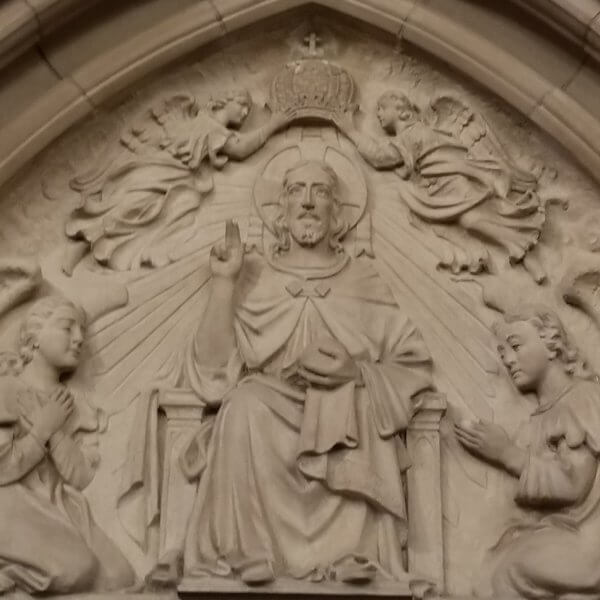
The Truth Will Set You Free
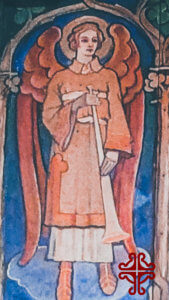 Today is Christ the King Sunday, the last Sunday of Ordinary Time before Advent — the season when we wait, hopeful and expectant, to celebrate Jesus’ birth. In our secular calendar, today is the Sunday before the Thanksgiving holiday. So it’s the last Sunday of ordinary, as in non-holiday season, time, before the big, commercial hullabaloo of Black Friday and Cyber Monday — and Giving Tuesday, by the way — kick off the secular holiday season. We also know now that we’re entering a new phase in the ongoing pandemic that definitely is not ordinary time as we see COVID positivity rates reaching new highs. The word ordinary means different things in different contexts. Christ the King Sunday is a uniquely fitting time to think about context and language, and how context can challenge — even unsettle — our understandings, specifically around the notions of truth and authority.
Today is Christ the King Sunday, the last Sunday of Ordinary Time before Advent — the season when we wait, hopeful and expectant, to celebrate Jesus’ birth. In our secular calendar, today is the Sunday before the Thanksgiving holiday. So it’s the last Sunday of ordinary, as in non-holiday season, time, before the big, commercial hullabaloo of Black Friday and Cyber Monday — and Giving Tuesday, by the way — kick off the secular holiday season. We also know now that we’re entering a new phase in the ongoing pandemic that definitely is not ordinary time as we see COVID positivity rates reaching new highs. The word ordinary means different things in different contexts. Christ the King Sunday is a uniquely fitting time to think about context and language, and how context can challenge — even unsettle — our understandings, specifically around the notions of truth and authority.
Pilate and Jesus
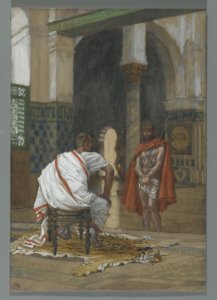 In John’s gospel today, we hear Pilate ask Jesus if he is king of the Jews. First Jesus answers, My kingdom is not from this world … If my kingdom were from this world, my followers would be fighting to keep me from being handed over to the Jews. But as it is, my kingdom is not from here. Pilate takes this all in and tries again: So you are a king? Pilate says. Jesus answers, You say that I am a king. I was born, and came into the world, to testify to the truth. Everyone who belongs to the truth listens to my voice. The very next words in John’s gospel are not included in today’s reading, and yet they point directly to what Jesus is teaching us here about truth and authority.
In John’s gospel today, we hear Pilate ask Jesus if he is king of the Jews. First Jesus answers, My kingdom is not from this world … If my kingdom were from this world, my followers would be fighting to keep me from being handed over to the Jews. But as it is, my kingdom is not from here. Pilate takes this all in and tries again: So you are a king? Pilate says. Jesus answers, You say that I am a king. I was born, and came into the world, to testify to the truth. Everyone who belongs to the truth listens to my voice. The very next words in John’s gospel are not included in today’s reading, and yet they point directly to what Jesus is teaching us here about truth and authority.
Today’s reading stops the just before Pilate speaks: “What is truth?” retorted Pilate. The original Greek tells us more than that Pilate simply says this — John’s gospel uses the verb lego, which means something more like point out, or call attention to. The point is that Pilate is really asking, even though Pilate has all the force and secular power in that moment. John’s gospel is working really hard to focus our attention authority. Does authority come from secular political power — with armies and force, like the power of a king? Or does authority come from a source that does not depend on the power of one person, or group of people, over others?
Christ the King
Of course this gospel reading is appointed for Christ the King Sunday — our time to consider what it means to live in the Kingdom of God. Christ the King Sunday is a fairly recent feast day — less than 100 years old. Pope Pious XI established the Feast of Christ the King in 1925 after World War I as nationalism and totalitarianism continued to rise and threaten the hard-won peace. The idea was to focus the faithful on the reign of God — the power of love, not of empire. This is the conversation that Pilate and Jesus are having in John’s gospel today: where does power and authority come from? Is Jesus a king? Does Jesus have power and authority?
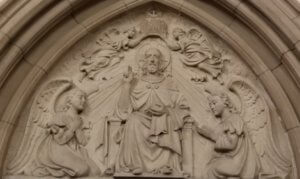 Christ is King was the rallying cry of first century Christians. It was a dangerous thing to say, though, because in the first century Roman Empire, the emperor himself was thought to have the status of a god. Julius Caesar was formally deified in 42 BCE after his assassination, and his adopted son Octavius — later conferred the title Augustus — was referred to as the son of the god. It was risky business to go around confronting armed power in the Roman Empire with bold and incendiary claims like Christ is King. This is why the notion of truth — and the courage to speak it, hear it, and live it — is front and center here.
Christ is King was the rallying cry of first century Christians. It was a dangerous thing to say, though, because in the first century Roman Empire, the emperor himself was thought to have the status of a god. Julius Caesar was formally deified in 42 BCE after his assassination, and his adopted son Octavius — later conferred the title Augustus — was referred to as the son of the god. It was risky business to go around confronting armed power in the Roman Empire with bold and incendiary claims like Christ is King. This is why the notion of truth — and the courage to speak it, hear it, and live it — is front and center here.
Let’s go back to that dialogue in John’s gospel between Jesus and Pilate, that turns on the use of the word we translate into English as king. The Greek word in the gospel is basileus, which is related to our word basis — that is, the foundation of all that is — the ground of all being. It’s only when we limit our understanding of power to our own human experience that we envision worldly rulers like kings or dictators. Pilate asks Jesus if he is the King — actually, the source of all power — of the Jews, and Jesus responds that the source of his power is not from this world, but that he has come into the world for the very purpose of testifying to the truth.
What is Truth?
Pilate then drills down even farther to question the nature of truth itself. John’s gospel laid the foundation for this moment in 8:31, telling us that authority does not come from the power of human beings over other human beings — whether by force, or any kind of coercion — economic, ideological, religious, or cultural. Authority comes from truth. In John 8:31, just 10 chapters before today’s gospel, Jesus tells the disciples,
If you abide in my word, you are truly my disciples, and you will know the truth, and the truth will set you free.
So what is truth? Our translation today says Pilate retorts the question what is truth, as though Pilate were disagreeing with Jesus, but remember what happens next in the conversation, and judge the suitability of translating legos as retort on your own. Pilate hears Jesus’ answer and says I find no basis for a charge against him. Jesus’ conviction and execution comes from the insistence of the crowd — Pilate washes his hands of the matter.
If you abide in my word, you are truly my disciples, and you will know the truth, and the truth will set you free.
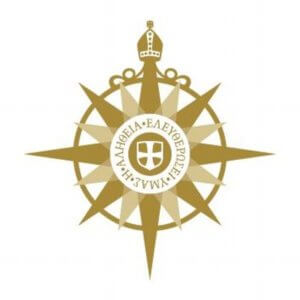 The last phrase, the truth will set you free, is inscribed in Biblical Greek around the symbol of the Anglican Communion — our global communion of parishes, dioceses, and provinces all around the world we pray for each week — reminding us that our freedom is in our discipleship to God’s Word of love and justice. Abiding — staying and living — in Jesus’ Word — the very activity of God in human skin — is the truth that sets us free. Amen
The last phrase, the truth will set you free, is inscribed in Biblical Greek around the symbol of the Anglican Communion — our global communion of parishes, dioceses, and provinces all around the world we pray for each week — reminding us that our freedom is in our discipleship to God’s Word of love and justice. Abiding — staying and living — in Jesus’ Word — the very activity of God in human skin — is the truth that sets us free. Amen
